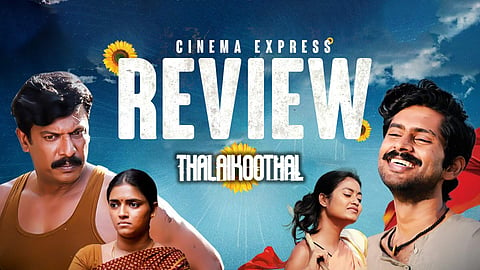Thalaikoothal Movie Review: A well-crafted film that only gets better with immersive storytelling
Rating:(3 / 5)
The formative years of a person determine one's core belief system. Often, people find it hard to let go of this belief system even if presented with credible opposition. The rights and wrongs of these notions notwithstanding, this belief system is so entrenched in our minds that recalibration of our own ethics is acceptable for changing our beliefs.
Thalaikoothal's protagonist Pazhani too faces a similar predicament as his father, Muthu, who tells him at a very young age that humans do not have the right to kill any life form, and only nature has that power. Years later, we see an adult Pazhani (Samuthirakani), still unshaken by his belief, standing against his whole family, who are planning to end the life of Muthu, who is now in a vegetative state, through the practice of thalaikoothal (senicide of the elderly). Director Jayaprakash Radhakrishnan wastes no time in establishing the world of Thalaikoothal, and liberally uses seemingly random visual imagery that has a poignant callback towards the end. Take, for instance, the oriental garden lizard, seen in various scenes. It is through one such lizard that Muthu imparts Pazhani's core belief. The same lizard is later shooed off due to superstition. Through throwaway scenes, we are soon acquainted with the lives of Pazhani, his wife Kalai (Vasundhara), their cold equation, and more. It is a neat way of packaging the important elements in the film's first few minutes. There is Pazhani, neck deep in loans, and his daughter (Baby Vishrutha), who are the only ones hoping that Muthu will come back from his state. We also get to see young Muthu (Kathir) who is in love with Pechi (Katha Nandi), a washerwoman from a marginalised community. There are tonnes of other tiny details that are neatly showcased too.
Director: Jayaprakash Radhakrishnan
Cast: Samuthirakani, Kathir, Vasundhara, Vayapuri, Katha Nandi, and others
Jayaprakash cleanly weaves in Muthu’s flashback sequences with his current vegetative state. The state of Muthu, whether he is in a lucid dream or recollecting his memories, leaves us with enough room to ponder how the subconscious psyche of humans work. But more importantly, this dream sequence is both a breeze and a plot pusher. There is a purpose as to why each of these scenes is placed in the order, and the editing helps a lot to effectively convey the story. The director makes sure that all the knots are tied, and that the characters are justified for acting the way they are.
If Pazhani refuses to kill his father because of what he learned in his childhood, Kalai’s anger stems from the harassment she faces as a woman at her workplace. A subtle act of the daughter hiding her exam paper near Muthu’s bed, under the belief that Kalai will not be able to find it, conveys the family dynamics within seconds. But it is instances like these that make Thalaikoothal an immersive experience. Juxtaposing the man’s most beautiful moments with his final days of incapability is both surreal and hard-hitting. Visuals of magical realism are interspersed to convey subtle themes in the film like superstitions, fear, and love.
The beauty of Thalaikoothal is that it never takes a stand about the practice. Although we have characters making their choices, the film stirs itself clear of taking any such sides. There are questions left unanswered, and I say this in a positive way because it helps us to savour the art of filmmaking for what it is: varied interpretations, and a personal viewing experience. Thalaikoothal further makes me reiterate how stories set against a rural backdrop (which may be considered the most regressive parts of the state) have the most liberal thoughts, at least when it comes to representing people. After the well-crafted and humanising portrayal of Pariyan’s father, who dances in drag clothing in Pariyerum Perumal, I also found it particularly interesting that Thalaikoothal brings in a character of Muniyandi Kelavi (Vayapuri), dressed in solid-coloured cotton sarees and is a saint in the village. The very fact that there are no questions thrown at this person’s gender or choice of dressing, has a normalising effect, and helps us to focus on the core plot point, whilst subconsciously consuming such progressive ideas of people and gender.
If Jayaprakash has to be credited for bringing in depth-full characters and interesting facets to storytelling, the technical brilliance moves the film forward (barring a few portions of dubbing in Katha Nandi's scenes). The sound design of the entire film and sync sound carried for the current timeline track, intertwining chops back and forth, and cinematography, uphold the core emotions of Thalaikoothal. While the film does suffer from pacing issues, its negligence can sometimes give you room to get immersed into the world of Thalaikoothal, which the team successfully delivers.

